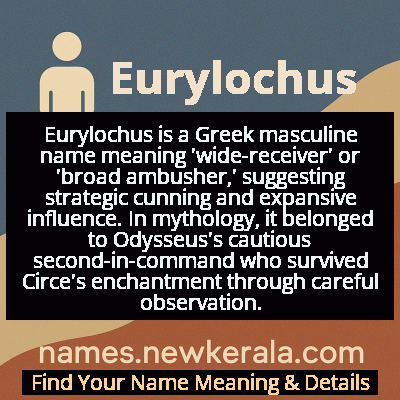Eurylochus Name Meaning & Details
Origin, Popularity, Numerology Analysis & Name Meaning of Eurylochus
Discover the origin, meaning, and cultural significance of the name EURYLOCHUS. Delve into its historical roots and explore the lasting impact it has had on communities and traditions.
Name
Eurylochus
Gender
Male
Origin
Greek
Lucky Number
3
Meaning of the Name - Eurylochus
Eurylochus is a Greek masculine name meaning 'wide-receiver' or 'broad ambusher,' suggesting strategic cunning and expansive influence. In mythology, it belonged to Odysseus's cautious second-in-command who survived Circe's enchantment through careful observation.
Eurylochus - Complete Numerology Analysis
Your Numerology Number
Based on Pythagorean Numerology System
Ruling Planet
Jupiter
Positive Nature
Optimistic, inspirational, and creative.
Negative Traits
Scattered, exaggerating.
Lucky Colours
Yellow, gold, purple.
Lucky Days
Thursday.
Lucky Stones
Yellow sapphire.
Harmony Numbers
1, 2, 9.
Best Suited Professions
Arts, writing, communication.
What People Like About You
Creativity, optimism.
Famous People Named Eurylochus
Eurylochus of Same
Mythological Greek Warrior
Second-in-command to Odysseus who survived Circe's enchantment and warned his crew about her magic
Eurylochus of Thessaly
Ancient Greek Military Commander
Spartan commander during the Peloponnesian War who led significant military campaigns in northwestern Greece
Eurylochus the Poet
Ancient Greek Lyric Poet
Minor Greek poet mentioned in ancient sources whose works survive only in fragments
Name Variations & International Equivalents
Click on blue names to explore their detailed meanings. Gray names with will be available soon.
Cultural & Historical Significance
Throughout Greek literature, Eurylochus serves as an important foil to Odysseus's heroic ambitions. While Odysseus embodies cunning and endurance, Eurylochus represents the more grounded perspective of the common soldier. His character explores themes of loyalty versus self-preservation, and the moral compromises necessitated by extreme circumstances. The name Eurylochus has become synonymous with the 'survivor' archetype in classical studies—someone who navigates danger through caution rather than boldness. His legacy in Western literature influences how secondary characters are developed as moral counterpoints to protagonists, particularly in epic narratives where leadership is tested against the will of both followers and gods.
Extended Personality Analysis
Individuals named Eurylochus are typically characterized by a blend of cautious pragmatism and loyal leadership. They possess a natural wariness that serves as both strength and limitation—carefully assessing situations before committing, yet sometimes missing opportunities due to over-caution. Like their mythological namesake, they often serve as reliable seconds-in-command rather than seeking the spotlight, offering grounded perspectives that balance more visionary leaders. Their survival instinct is strong, and they excel in crisis management, though they may struggle with decisions that require bold, unconventional thinking. There's an inherent tension in their personality between their protective instincts toward their group and their self-preservation drive, which can create complex moral dilemmas in leadership situations.
Eurylochus personalities typically demonstrate strong observational skills and the ability to learn from others' mistakes, making them excellent strategists in avoiding obvious dangers. However, their pragmatic nature can sometimes border on pessimism, and they may be prone to rebellion against authority when they perceive their survival or the group's welfare is threatened. They value loyalty but maintain a healthy skepticism, and their trust must be earned through demonstrated competence rather than assumed authority. In modern terms, they embody the 'realist' personality—grounded, practical, and focused on immediate consequences rather than abstract ideals. Their leadership style tends to be more democratic and consensus-based than autocratic, though they can become stubborn when their survival instincts are triggered.
Modern Usage & Popularity
In contemporary times, Eurylochus remains an exceptionally rare given name, primarily used by classical scholars, mythology enthusiasts, or parents seeking a distinctive name with deep historical roots. Its usage is almost exclusively confined to Greece and academic circles, with no recorded popularity in modern name databases. The name's complexity and strong mythological associations make it challenging for everyday use in most cultures. However, it occasionally appears in literary contexts, as character names in historical fiction, or among families with strong connections to classical studies. The name's decline reflects broader trends away from complex ancient names toward simpler, more internationally accessible options. In recent years, there has been a minor resurgence of interest in mythological names, but Eurylochus remains at the most obscure end of this spectrum due to its length and the ambiguous nature of its most famous bearer.
Symbolic & Spiritual Meanings
Symbolically, Eurylochus represents the archetype of the cautious survivor and the pragmatic second-in-command. The name embodies the tension between loyalty and self-preservation, serving as a metaphor for the ordinary individual navigating extraordinary circumstances. His most famous symbolic moment—being the only crew member to escape Circe's initial enchantment—represents the power of cautious observation and the value of learning from others' misfortunes. The subsequent transformation of his crewmates into swine symbolizes the loss of human reason to base desires, with Eurylochus standing as the guardian of rationality. Later, his role in convincing the crew to slaughter Helios's cattle represents how desperation can lead even cautious people to defy divine law, symbolizing the human struggle between immediate survival needs and long-term consequences. The name thus carries dual symbolism: both the wisdom of caution and the dangers of pragmatic compromise when pushed to extremes.

